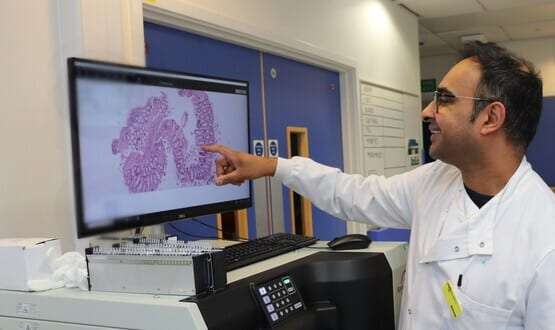Salford urges move to digital pathology
- 1 May 2015

Salford Royal NHS Foundation Trust has called for the whole of Manchester to use digital pathology services, following a successful pilot with Sectra.
The trust's neuropathology services have been a 'test bed' for Sectra's system over the past few months.
The system allows pathologists to compare several high-resolution images at once and quickly bring different images into view. This speeds up the process as staff no longer have to move slides on and off a microscope when reviewing multiple images.
Anne Yates, cellular pathology services manager at Salford Royal, said: “If we had this system pan-Manchester it would revolutionise pathology."
She believes that a citywide system would benefit patient care as pathology images could be accessed remotely if a patient needs to move to another hospital in the area.
This would improve on the current system that involves slides being sent physically. “This can be a slow process and there is a danger of items being lost,” said Yates.
Speaking to EHI News, Dave Bowen, sales manager for Sectra Digital Pathology Solutions, said: “there can’t be collaboration if you rely on analogue imaging being sent in jiffy bags in the back of taxis.
"If you ask patient if they thought pathology was still being done on a microscope – a more than 100-year -old technology – they will look at you strangely.”
Yates was initially concerned that hospital pathologists would continue to use microscopes for the majority of their work during the pilot.
However, this did not happen. One consultant switched to the new system after just two days and the other switched after just three.
“Everyone who works in healthcare has seen the dramatic effect PACS [picture archiving and communication systems] has had in radiology. This is the equivalent in cellular pathology," she explained.
“It’s an exciting time. We have the chance to work with virtual pathologists who are not on site.”
Daniel du Plessis, a consultant neuropathologist and clinical lead in Salford Royal’s pathology department, said the benefits extended beyond the short-term gains of not handling slides.
“Having it digitally available was an incentive to tackle even non-urgent cases straight away because of the ease of accessing everything immediately. That immediately led to significant improvement in the turnaround times of reporting.”
Salford Royal will continue to use digital pathology in its neuropathology services and Yates is keen to extend the service to more general pathology services.
Royal Salford is one of the first digital pathology projects at an NHS trust. Its move follows the deployment of the Omnyx Integrated Digital pathology system from GE Healthcare at University Hospitals Coventry and Warwickshire NHS Trust in April last year.




